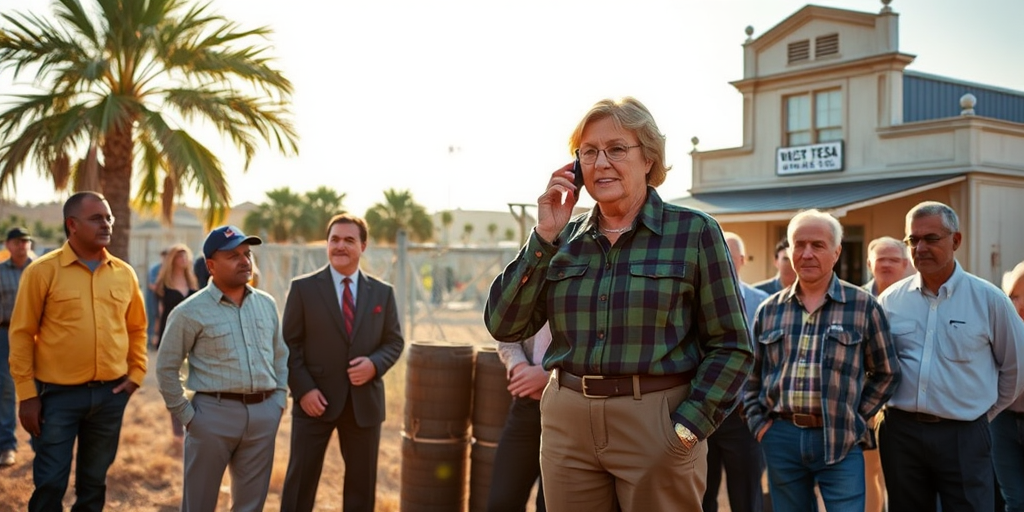Brooke Rollins Influences Trump’s U-Turn on Immigration Raids: Impact on the Rio Grande Valley
In a surprising shift in U.S. immigration policy, U.S. Agriculture Secretary Brooke Rollins is being credited with influencing President Trump to halt federal immigration raids targeting undocumented workers in the agriculture sector. This policy change could have significant ramifications for the Rio Grande Valley (RGV), a community intimately connected with the agricultural economy.
Rollins’s Intervention and Trump’s Decision
The intervention by Secretary Rollins came after she highlighted to President Trump the substantial concerns among farmers and agricultural organizations regarding the workforce’s stability. According to an article in The New York Times, more than 40% of crop workers nationwide, including many in the RGV, are undocumented. Rollins’s conversations with Trump underscored these workers’ critical role in sustaining an essential part of the American economy.
Previously, Rollins had attempted to communicate these concerns, but it was a recent conversation that prompted the president to reconsider his hardline approach. The subsequent announcement on Trump’s social media platform, Truth Social, acknowledged immigrants’ contributions to the agriculture and hospitality sectors and hinted at more lenient immigration policy changes.
Reactions from the White House and Beyond
President Trump’s decision reportedly took many in the White House by surprise, particularly those who supported stringent immigration enforcement, like Deputy Chief of Staff Stephen Miller. This divide in administration perspectives highlights the ongoing controversy and complexity surrounding U.S. immigration policies.
Locally, there has been a spectrum of reactions. Protests organized by various groups, such as the Juan Rivera, Sr., and Veteran’s LULAC Council in San Benito, reflect the community’s agitation over the uncertainty and fear caused by recent ICE raids. Local leaders argue that these raids have disrupted economic activities and created tension within communities.
Impact on the Rio Grande Valley
For South Texas, and specifically the RGV community, Trump’s policy shift is more than a federal issue—it hits close to home. The Valley’s agricultural sector is a cornerstone of its economy, heavily reliant on migrant workers, many of whom lack legal status. Agricultural leaders have long warned about the chilling effect of immigration raids on their workforce.
Manuel Garza, president of the South Texas Alliance of Cities, commented, “Our agricultural economy depends significantly on these workers. Raids disrupt not only the farms but entire supply chains, impacting local businesses and communities.”
The region’s agricultural organizations, alongside business leaders, have expressed relief at the prospect of reduced enforcement, which they believe could stabilize the workforce and boost local economic confidence. Supporting agriculture supports the entire RGV economy, ensuring continuity in productivity and supply.
Historical Context of Immigration and Policy in the Valley
Immigration is a longstanding issue in the RGV, knitting itself into the fabric of daily life and local history. The Valley has historically grappled with immigration dynamics that affect everything from education to economic policies. Previous federal policies have met with mixed reactions, mirroring the current balance sought between enforcement and economic necessity.
Community members like Elisa Rodriguez, a McAllen resident with deep roots in agricultural employment, express hope that new policies will offer the stability that farming families have long sought. “It’s about time we saw recognition of the work our immigrant neighbors do. They deserve stability and respect,” Rodriguez noted.
The Road Ahead: Potential Implications and Future Considerations
Looking forward, questions remain about the broader implications of this policy reversal. Will the leniency extend beyond agriculture and hospitality to other sectors? How might this influence larger legislative debates regarding immigration reform?
Ramiro Castillo, an economist at South Texas College, predicts this policy shift could present an opportunity for comprehensive immigration reform. “If policymakers capitalize on current momentum, it could lead to more humane and effective immigration laws, tailored to the needs of areas deeply integrated with the immigrant workforce like the RGV.”
While the current story represents a positive move for the agricultural sector, it’s crucial for RGV residents and leaders to stay informed and engaged. Potentially involved in long-term policy dialogues are civic organizations, business leaders, and government representatives who will carry forward discussions on sustainable immigration practices.
Resources for RGV Residents
To provide further clarity, the Rio Grande Guardian offers continuous updates on immigration issues. Residents can access local resources and participate in discussions about how current changes may affect them. Community forums and workshops are planned to foster dialogue and disseminate information among RGV residents.
In summary, while this change in immigration policy signals hope for greater workforce stability in agriculture, it also invites RGV residents to reflect on the complex socio-economic weave of immigrants in their community life. Continued engagement and open dialogue will be crucial as new policies unfold and shape the future of the Valley’s economy and cultural identity.







